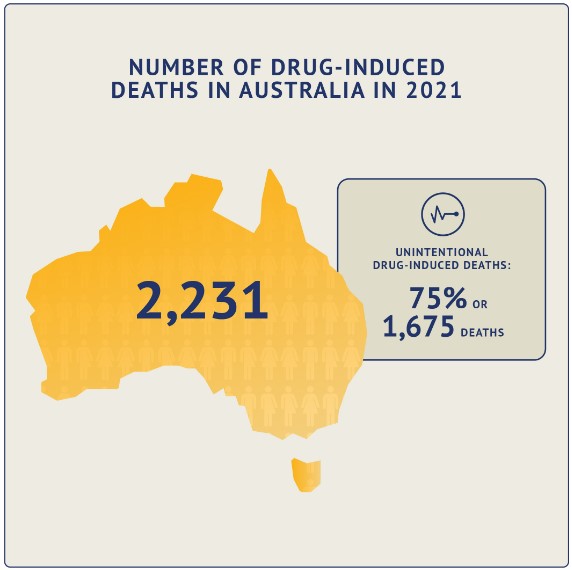Thursday 31 August 2023 marks annual International Overdose Awareness Day. This year's theme 'Recognise those who go unseen' honours the people whose lives have been altered by overdose. They are the family and friends grieving the loss of a loved one; workers in healthcare and support services providing strength and compassion; or first responders who assume the role of lifesaver.
The day seeks to create better understanding of overdose, reduce the stigma of drug-related deaths, and create change that reduces the harms associated with drug use.
The Pennington Institute's Australia's Annual Overdose Report 2023 reveals that there have been 2,231 drug induced deaths in Australia in 2021 with 75% (1,675) being unintentional.

Know the risk factors of overdose
There are many factors that may increase the risk of experiencing an overdose. Understanding these risk factors supports overdose prevention because it places people and communities in a strong position to manage or mitigate these risks.
Some of the main risk factors of drug overdose are:
- Using more than one drug at a time or sequentially also known as polydrug use (learn more here),
- Redosing too soon,
- Dependence or addiction to a substance or drug,
- Changes in tolerance (e.g., using drugs again after a period of abstinence or even after a break as short as two or three days),
- A lowered immune system or chronic health conditions such as obesity or heart disease,
- Using a higher dose of a drug than usual or redosing soon after using the first time,
- Using alone or in an unfamiliar place,
- A history of overdose.
Naloxone - life-saving opioid overdose-reversing drug
Accidental opioid overdose continues to be a significant cause of death in Australia and the opioid overdose-reversing medicine, naloxone is available for free in NSW. Naloxone is a short-acting opioid antagonist that reverses the effects of an opioid overdose.
When an opioid overdose happens, a person's breathing slows down or completely stops, leading to rapid loss of consciousness and potentially death if help is not given in time. Naloxone works by binding to the opioid receptors in the brain, blocking the effects of opioids.
When administered in time, naloxone can temporarily reverse the effects of an opioid overdose, enabling the person to breathe normally while waiting for an Ambulance to arrive.
Naloxone is available in NSW for free for anyone at risk of witnessing or experiencing an opioid overdose. Anyone can receive free naloxone without a prescription from community pharmacies, non-governmental organisations (NGOs) and NSW Needle and Syringe Programs (NSP) registered in the take home naloxone program.
Go to Take Home Naloxone for further details, including a list of participating pharmacies, NGOs and NSPs.
For further information and to request Australia's annual overdose report 2023, visit https://www.penington.org.au/australias-annual-overdose-report
Are drugs a problem for someone you care about? Contact Family Drug Support (FDS) for 24 hours, 7 days a week phone support on 1300 368 186 or visit fds.org.au.
For free and confidential advice 24/7 Alcohol and Drug Information Service (ADIS) on 1800 250 015. Counsellors are available to provide information, referrals, crisis counselling and support. Or start a Web Chat with an ADIS counsellor online Monday to Friday, 8.30am – 5pm.
